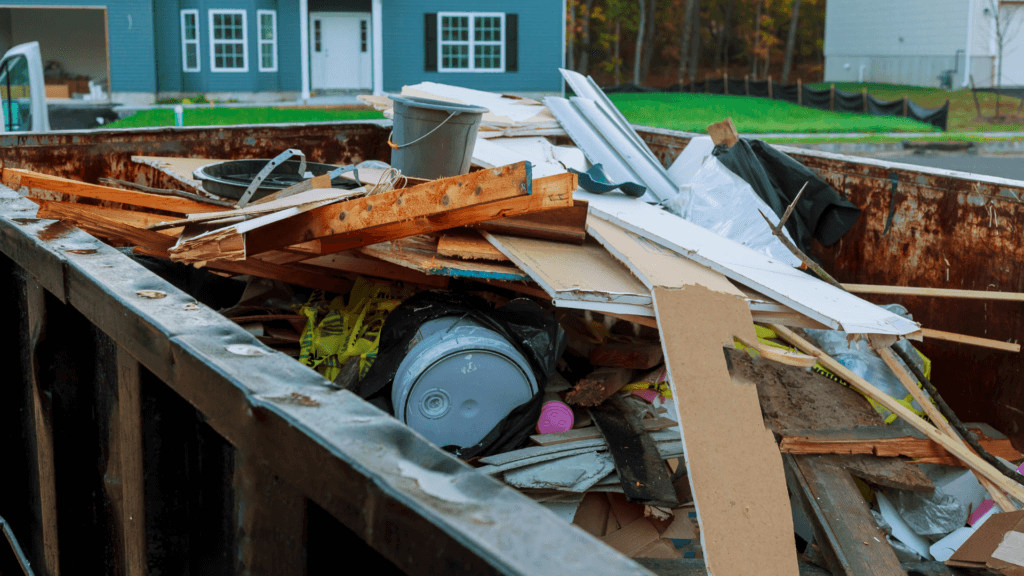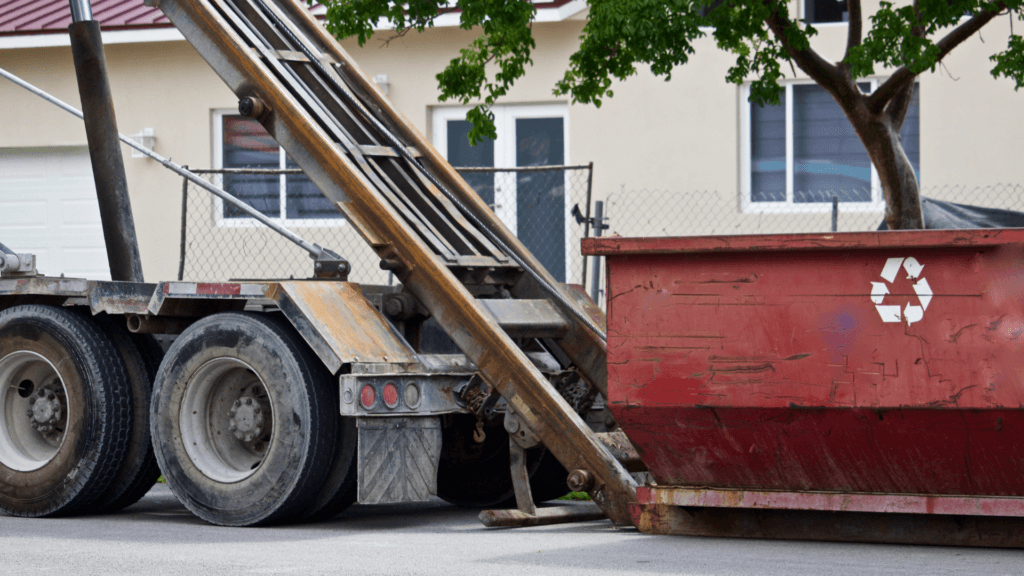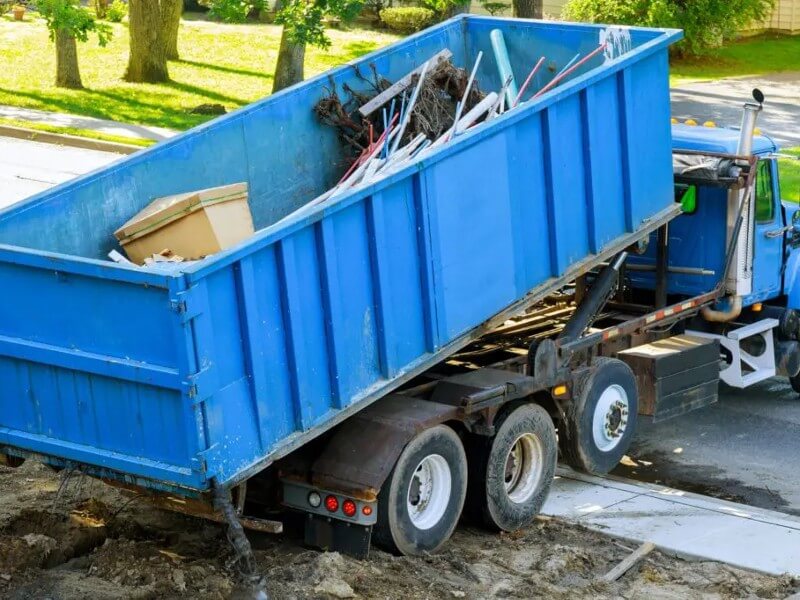Hazardous Waste Disposal for Roll-Off Dumpster Businesses
Understanding Hazardous Waste in the Context of Roll-Off Dumpster Rentals
In the realm of roll-off dumpster rental businesses, it’s crucial to be aware of the various types of waste, especially those that fall under the category of “hazardous.” Missteps in handling these wastes can lead to severe consequences.
Definition and Types of Hazardous Waste
Hazardous waste, simply put, refers to materials that are harmful to the environment and can pose dangers to health when not handled properly. These wastes can be a by-product of industrial processes, but they can also come from everyday household items. Some of the defining characteristics of hazardous waste include being flammable, toxic, corrosive, or reactive. Here’s a simplified breakdown:
- Flammable: Materials that can easily catch fire.
- Toxic: Substances that can cause harm when ingested or absorbed.
- Corrosive: Items that can erode metals and other materials.
- Reactive: Materials that can cause explosions or release toxic fumes.
Common Sources and Items Classified as Hazardous Waste
Roll-off dumpster rentals cater to a range of projects – from household cleanouts to construction sites. Given this range, it’s no surprise that hazardous waste can emerge from various sources. While factories or labs might deal with large volumes of such waste, even common household items might be hazardous. Here are a few items to watch out for:
- Paints and solvents
- Batteries (like those in flashlights or toys)
- Pesticides or fertilizers
- Cleaning agents with strong chemicals
- Used motor oil or antifreeze
Spotting these items is the first step. Properly educating customers and ensuring they are not mixed in with regular waste is the next vital action.
It’s worth noting that the roll-off dumpster rental industry changes based on location, local laws, and the types of projects a company might cater to. Keeping an eye out for potential hazardous waste, being well-informed, and safe handling is important for every business in this industry.

Legal and Environmental Implications of Hazardous Waste in Roll-Off Dumpster Rentals
Navigating the complex terrain of hazardous waste disposal isn’t just about understanding what counts as dangerous materials. It’s also about being acutely aware of the legal requirements and the environmental consequences tied to these materials.
Legal Penalties and Fines
In many regions, there are strict laws in place that dictate how hazardous waste should be treated. Ignoring these laws can lead to:
- Penalties and Fines: The most immediate consequence of not following hazardous waste disposal regulations is often financial. Fines can be steep, sometimes causing a large dent in a company’s profits.
- License Revocation: Continued non-compliance or severe violations can result in authorities revoking business licenses, which can cease operations.
- Criminal Charges: In extreme cases, particularly if negligence leads to harm, business owners might even face criminal or civil charges.
Environmental Impact of Hazardous Waste
Beyond the legal consequences, mishandling hazardous waste has dire environmental implications:
- Water Contamination: Incorrectly disposed of chemicals can seep into groundwater, affecting both human consumption and aquatic ecosystems.
- Air Pollution: Certain hazardous wastes, when burned or left exposed, release toxic fumes into the atmosphere. This not only deteriorates air quality but also contributes to global warming.
- Land Degradation: Dumping hazardous materials can degrade the soil, making it infertile and affecting agriculture and natural vegetation.
Community Health and Safety
Lastly, it’s impossible to ignore the direct impact on community health:
- Toxin Exposure: Communities near improperly managed dumpsites are exposed to harmful toxins that can lead to severe health issues.
- Risk of Explosions or Fires: As mentioned, reactive or flammable wastes can lead to unforeseen accidents, endangering lives.
The Reputation of the Roll-Off Dumpster Industry
Beyond legal and environmental concerns, there’s the business’s reputation to consider. Ensuring strict adherence to hazardous waste disposal guidelines reflects a company’s commitment to the environment and community welfare. On the other hand, negligence can tarnish the business image, making it hard to gain customer trust in the future.
In essence, being proactive in understanding and complying with hazardous waste disposal regulations is not only a business necessity but also an ethical responsibility. A little diligence goes a long way in safeguarding the environment, the community, and the very foundation of the roll-off dumpster rental business.

Safety Protocols and Best Practices for Hazardous Waste in Roll-Off Dumpster Rentals
Understanding safety measures and best practices is pivotal for any roll-off dumpster rental business dealing with hazardous waste. Ensuring the safety of workers, clients, and the environment is not just a moral obligation but also a solid business strategy.
Identification and Labeling
Before diving into specific safety protocols, it’s crucial to know what you’re dealing with:
- Hazard Assessment: Evaluate the type of hazardous waste being disposed of. This includes understanding its properties, potential reactions, and level of danger it poses.
- Clear Labeling: Every dumpster containing hazardous materials should be clearly labeled, indicating the nature of the waste and any associated risks.
Employee Training
Workers are on the front lines when it comes to waste handling. As such, they must be well-prepared:
- Regular Workshops: Organize training sessions to educate employees on the different types of hazardous waste and how to handle them.
- Equip with PPE: Provide all workers with appropriate Personal Protective Equipment (PPE), such as gloves, masks, and protective eyewear.
Proper Waste Segregation
Mixing different types of waste can be a recipe for disaster:
- Dedicated Dumpsters: Designate specific dumpsters for hazardous waste. Never mix hazardous waste with general trash.
- Avoid Combining: Different hazardous materials can react violently when mixed. Always keep them separated.
Emergency Response Plans
Accidents can happen, even with the best precautions in place:
- Emergency Kits: Ensure that every vehicle and worksite has a first-aid and spill-response kit.
- Clear Protocols: Create and distribute a clear, step-by-step guide on what to do in case of spills, leaks, or other emergencies. Regularly rehearse these protocols with staff.
Safe Transportation
Moving hazardous waste from point A to B poses its own set of challenges:
- Sturdy Vehicles: Ensure that vehicles used for transporting hazardous waste are in good condition, with no risk of leaks or breaks.
- Route Planning: Pre-plan routes to minimize travel time and avoid heavily populated areas whenever possible.
Final Disposal
The job isn’t done until the waste is properly disposed of:
- Approved Facilities: Only dispose of hazardous waste at approved and certified facilities. This ensures the waste is treated in an environmentally sound manner.
- Documentation: Maintain records of all hazardous waste disposals, including the type of waste, amount, disposal method, and date of disposal.
In summary, dealing with hazardous waste requires a meticulous approach. By adhering to stringent safety protocols and constantly updating best practices, roll-off dumpster rental businesses can protect both their team and the environment, while also building trust with their customers.

Navigating Hazardous Waste with Confidence
As roll-off dumpster rental businesses venture into the realm of hazardous waste disposal, it’s important to recognize the responsibility that accompanies this service. Safeguarding the environment, ensuring public safety, and adhering to legal guidelines are paramount. With the right knowledge, training, and dedication to best practices, businesses can confidently offer this service while making a positive contribution to community safety and environmental protection. Embracing these principles not only ensures compliance but also strengthens a company’s reputation and trustworthiness in the eyes of its customers.
FAQs on Hazardous Waste Disposal for Roll-Off Dumpster Rentals
1. What qualifies as hazardous waste in a roll-off dumpster rental context?
Hazardous waste typically includes materials that are toxic, flammable, corrosive, or reactive. Examples include paints, solvents, chemicals, certain electronic items, and batteries. Always consult local regulations to get a comprehensive list.
2. Can all roll-off dumpsters handle hazardous waste?
No, not all dumpsters are designed to handle hazardous waste. It’s vital to inform the rental company in advance if you intend to dispose of such materials. They might have specialized containers or offer specific guidance for such disposals.
3. What are the penalties for improper hazardous waste disposal?
Improper disposal can lead to severe penalties, including hefty fines and potential legal action. Violations can also tarnish a company’s reputation and lead to loss of business.
4. How can I ensure that my employees are well-trained in handling hazardous waste?
Regular training sessions, workshops, and certifications related to hazardous waste management are recommended. Partnering with local environmental agencies or hiring experts for in-house training can also be beneficial.
5. Are there any special permits required for transporting hazardous waste?
Yes, transporting hazardous waste typically requires special permits and adherence to specific transportation guidelines. It’s crucial to be familiar with local and federal regulations and ensure all necessary permits are obtained.


